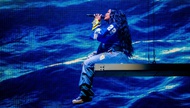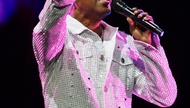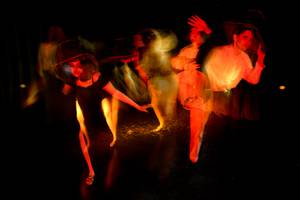Annie Clark first broke onto the scene as a solo artist in 2007 (her résumé includes stints in the Polyphonic Spree and Sufjan Steven’s band)—but it wasn’t until 2014 that the mainstream music world took notice. Better known by her stage name St. Vincent, the 32-year-old Clark spent nearly all of last year touring behind her eponymous fourth LP, which won the Grammy for Best Alternative Music Album. The Weekly caught up with Clark in Toronto one week prior to her Vegas debut, to talk about her new collaboration with David Byrne, the vast influence of digital media and the cuts and bruises that come with living life on the road.
What are you up to today? Right now I’m working on David Byrne’s color guard piece. It’s me and a number of other really amazing artists working with really creative color guard teams, some of the best in the country, and scoring pieces of music for those teams that will perform in New York and then also in Toronto. I’m in Toronto for a couple days and then I’m back in New York for rehearsal for the Jimmy Fallon show. We are playing a new song. And then I’m off to Las Vegas.
It’ll be your first time playing here, right? Yeah! I think I’ve only been to Vegas one time. I went to a Lady Gaga concert about five years ago with a friend of mine who was a really big Lady Gaga fan. It was a good show. There’s a picture on the Internet of me meeting Lady Gaga somewhere.
You enlisted Willo Perron, who’s worked with Kanye West, and choreographer Annie-B Parson for your show. What did they bring to the table? Willo worked on the album packaging and all the kind of press visuals and that side—all the future-cult-leader [stuff]. Annie-B Parson choreographed the show. And the wonderful lighting designer Susanne Sasic helped conceive the look of the show. It’s all collaboration, lots of back and forth. I wanted to make it structured and I wanted things to be very considered.
You have this move, this shuffle, which is so quirky and odd—it looks like you’re gliding across the floor. How difficult was it pinning those moves down? I have to say the shuffle is really the one thing that I can take credit for. It’s something that started happening kind of naturally, on the Strange Mercy tour, where it was just a backwards shuffle, just a natural movement. It’s not that hard. It’s one of the few things that’s easier to do in heels ... I do I have a pretty gnarly gash on my hand from being in Sao Paulo on Saturday and falling on a wooden floor.
Does that kind of stuff happen often? Yeah. I’m a very physical person in general—I like to run really fast, and I like to feel out of breath, and I like the adrenaline and I like a little bit of danger, so, yeah, I get hurt often. I will never have beautiful knees ever again; I just have the remnants of scabs over and over and over again. I mean, they’re not currently scabbed, but you know, bruises and cuts. I have a permanent indentation on my left leg from an incident in Japan. I don’t know. I think I need more iron, probably. When you stop eating red meat that’ll happen.
Are you a vegetarian? No, but I just turned 32 and lost my taste for red meat. It was a strange thing. You know what’s more interesting, certainly, is that Popeye was a propaganda campaign? Wartime propaganda. Like, they had all this spinach, and it was propaganda from the spinach lobby and they said that, “Oh, spinach has all this iron and you gotta be strong like Popeye.” Blah blah blah. But it turns out the guy, whoever was entering the statistics on the iron content of spinach, accidentally had the decimal point in the wrong place. I mean spinach has iron, but it’s not like, Wow. Spinach knocks it out of the park with iron. I’ve been watching a lot of Adam Curtis documentaries, and they’re kind of meant to make you feel, they’re kinda meant to weave together … a lot of the malevolent forces in business and government and all that. It sort of makes you feel quite paranoid, but in a good way.
You just won a Grammy for Best Alternative Album. How are you doing since you’ve been thrown into that limelight? I’m fine. I was a little bit beat up from just my insanity touring schedule last year; you just start to lose your mind a little bit. But this year has been really lovely. It’s basically been a tour of exotic beautiful locations and places that I hadn’t been, like South America and Asia and Taipei and Japan. I’ve been able to explore. I’ve been able to just be quite a bit healthier in terms of getting a chance to work out and getting a chance to have a moment of downtime and kind of re-center and do all that stuff. I love performing, but you do have to make sure you balance it out with not being on a stage, because otherwise you’re just running on empty, and that’s not a great place to be.
I don’t know if you’re writing new music right now, but does that nonstop momentum influence your lyrics? I’m always writing. Last night I had a dream about a particular [part] on the guitar, and I always wake up with a melody in my head. It’s just a matter of making sure you grab it and document it and store it away so you can do something with it later. With enough creativity you can break through any wall.
You’ve worked with so many great artists. You were in Sufjan Stevens’ band, you performed with the surviving members of Nirvana at that band’s Rock and Roll Hall of Fame induction, you’ve collaborated and toured with David Byrne, you sang on a Swans album—it seems like you’re comfortable playing almost anything. Is that the case? Is there anything you wouldn’t do? I like a challenge. I also like seeing how other people work, ’cause there’s always something to learn. And on a creative level, there’s a whole lot to learn from music you don’t like that much. My producer John Congleton said, “If I hear something, and I don’t like it, I don’t assume the problem is with the music. I assume the problem is with me, and I want to figure out what there is to like in something, or what is interesting about it.” If somebody gave you a free pizza, and you had a bite and you were like, “Oh, I don’t really like this pizza. I don’t like olives. It’s not my thing,” you wouldn’t be mad at it. You wouldn’t be like, “What the f*ck is this free pizza?” You know? You just wouldn’t. But for some reason, we live in a time where you can have anything you want essentially for free, if not actually for free, in terms of music. So people are able to sample things with no specific personal investment, except for maybe two minutes of time, if they make it that long. But music is so powerful that it still makes people angry if they don’t like it. The power of music or the power of art is that there’s some stuff that’s so polarizing that people either love it or they hate it. And that’s an interesting place to be.
I don’t know if you’ve been following the whole Robin Thicke, Marvin Gaye lawsuit, but do you have an opinion on musicians suing over copyright infringement? It seems to be a greater issue now, especially with greater access to technology and sampling, like you just mentioned. I don’t have an opinion on that particular case, because I haven’t I really haven’t followed up on it. I didn’t love the song, because it’s date rape-y to me. I was just confused at the intention behind it. [But] we never create in a bubble. How many times have people basically re-written The Beatles’ “Tomorrow Never Knows”? Even some producers, they’ll have a record they really like playing really low and go in and tell a band, “Just go riff over the top of this song, and then we’ll take the song away and we’ll see what we have.” There’s so many ways to be creative. That’s a cool way to start an idea for an original song.
What did you learn from collaborating with David Byrne? Never look back.
How so? Just by watching his exuberance about all things, and his curiosity about all things. I would liken playing music and collaborating with David to doing what I did a number of times, following David through a city on a bicycle. There are times when you’re worried that you’re almost going to get hit by a car. There are times where you go, “Uh oh, the sidewalk ended and now we’re riding on a highway.” Other times you’re like, “Why are we in this industrial part of Melbourne?” But then ultimately you end up at a beautiful beach or an amazing art gallery, and it’s always an adventure. That’s how I would kind of sum up my creative [collaboration] with David.
Technology is a big theme on the album, especially the song “Digital Witness.” What are your thoughts on digital and social media? I think it’s very multifaceted. I think on the one hand, it can be divisive in that people can spend so much time in their own room or in their own head that they eventually forget how to interact with other people in an analog way. But the other part of it is, if you have curiosity and generosity of spirit, you can go and learn about anything. Education doesn’t even have to be stratified as it once was and kept only to an elite few. I judged a teen-girl talent show in Brooklyn about a year ago, and these kids were amazing. They [were] incredibly put together, way more than I remember being as a 16-year-old. There was a standup comedian … there were singers. They had all of these skills. And after everybody I saw, I asked, “Where’d you learn how to do this?” and they said YouTube. So it’s great. It’s very multifaceted and like everything, it’s never one thing.
When you think of Vegas, what kind of feelings does it evoke? I feel like it could easily be fodder for a song on one of your albums. When I think of Vegas, I think of Dave Hickey, the great art/music/culture critic. He says the mistake people make when they go to Vegas—he loves Vegas—is that they try to view Las Vegas through the lens of the rest of America, but really we ought to view America through the lens of Las Vegas. It’s just America with an exclamation point after everything ... I don’t really gamble with money.
Well, luckily there’s a lot more to do in Vegas now. Yes! And I know that there are rad kids in Vegas. I think it’s easy to be a kid who likes whatever in New York City, but I’m from the suburbs of Dallas and my heart is very much with the suburban kids kind of growing up in a culturally barren landscape and making their own and seeking it out.
It sounds like you get it. Yeah, I get it. Trust me, I totally get it.
St. Vincent April 10, 8 p.m., $25. Boulevard Pool, 702-698-7000.








